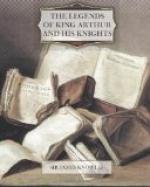“Ah, fair lady,” answered Balin, “worthiness and brave deeds are not shown by fair raiment, but manhood and truth lie hid within the heart. There be many worshipful knights unknown to all the people.”
“By my faith, thou sayest truth,” replied the damsel; “try therefore, if thou wilt, what thou canst do.”
So Balin took the sword by the girdle and hilt, and drew it lightly out, and looking on its workmanship and brightness, it pleased him greatly.
But the king and all the barons marvelled at Sir Balin’s fortune, and many knights were envious of him, for, “Truly,” said the damsel, “this is a passing good knight, and the best man I have ever found, and the most worshipfully free from treason, treachery, or villainy, and many wonders shall he achieve.”
“Now, gentle and courteous knight,” continued she, turning to Balin, “give me the sword again.”
“Nay,” said Sir Balin, “save it be taken from me by force, I shall preserve this sword for evermore.”
“Thou art not wise,” replied the damsel, “to keep it from me; for if thou wilt do so, thou shalt slay with it the best friend thou hast, and the sword shall be thine destruction also.”
“I will take whatever adventure God may send,” said Balin; “but the sword will I keep, by the faith of my body.”
“Thou will repent it shortly,” said the damsel; “I would take the sword for thy sake rather than for mine for I am passing grieved and heavy for thy sake, who wilt not believe the peril I foretell thee.” With that she departed, making great lamentation.
Then Balin sent for his horse and armour, and took his leave of King Arthur, who urged him to stay at his court. “For,” said he, “I believe that thou art displeased that I showed thee unkindness; blame me not overmuch, for I was misinformed against thee, and knew not truly what a knight of worship thou art. Abide in this court with my good knights, and I will so advance thee that thou shalt be well pleased.”
“God thank thee, Lord,” said Balin, “for no man can reward thy bounty and thy nobleness; but at this time I must needs depart, praying thee ever to hold me in thy favour.”
“Truly,” said King Arthur, “I am grieved for thy departure; but tarry not long, and thou shalt be right welcome to me and all my knights when thou returnest, and I will repair my neglect and all that I have done amiss against thee.”
“God thank thee, Lord,” again said Balin, and made ready to depart.
But meanwhile came into the court a lady upon horseback, full richly dressed, and saluted King Arthur, and asked him for the gift that he had promised her when she gave him his sword Excalibur, “for,” said she, “I am the lady of the lake.”
“Ask what thou wilt,” said the king, “and thou shalt have it, if I have power to give.”
“I ask,” said she, “the head of that knight who hath just achieved the sword, or else the damsel’s head who brought it, or else both; for the knight slew my brother, and the lady caused my father’s death.”




